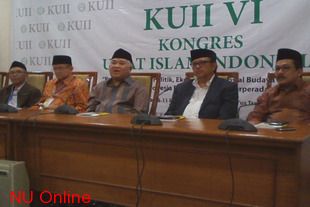Yogyakarta, NU Online
The importance of religious unity and tolerance toward members of other faiths or different sects highlighted the sixth Indonesian Muslims Congress (KUII) in Yogyakarta last week. <>
The Indonesian Ulema Council (MUI) organised the three-day meeting on Islam's place within and outside the archipelago. It wrapped up February 11th and featured speeches by leading Muslim clerics and scholars, as well as top officials from the new national government.
Islam's existence in Indonesia has served as a world model for harmonious society because of how Muslims here can live and work with people of other faiths in relative peace, Vice President Jusuf Kalla said at the February 9th opening.
"We always feel proud as the largest Muslim country. Consequently, we should be able to co-exist with the other [faiths] better than other nations do," Kalla said.
Two days later at the congress, President Joko "Jokowi" Widodo reiterated that message, saying Indonesia has shown tolerance and mutual respect is strong and that the nation always takes the middle ground.
"So there is no immense extremism and that is what other countries see [in us]," the Jakarta Post quoted Jokowi as saying.
According to the newspaper, Jokowi said leading moderate Muslim organisations such as Nahdlatul Ulama (NU) and Muhammadiyah could set an example as the country grapples with radicalism and terrorism.
Can Muslims and non-Muslims co-exist?
The congress, which convenes every five years, offers Indonesian Muslims an opportunity to discuss their various differences and problems in one venue, said Din Syamsuddin, MUI Chairman and Chief of Muhammadiyah.
"Pluralism is very good, as it presents some shades of differences, as well as shades of uniformity. With all those differences, let's make of KUII, a unifying force and give thanks to God that those differences are not a big deal for Indonesian Muslims," Din said.
He also expressed hope that differences between Muhammadiyah and NU would neither divide Indonesian Muslims nor pit them against one another through conflict.
"I hope Muslims are not allergic to or have prejudices towards differences," he added.
A worldwide model
The congress is important because it can serve as a guide for how inter-faith harmony can exist amid today's global challenges, according to Religious Affairs Minister Lukman Hakim Saifuddin.
The meeting also can help uphold the constitutionally-guaranteed right of Indonesians of all religions, cultures and ethnicities to practice their faiths freely and peacefully, Lukman told the KUII.
"Therefore, every religion must enjoy full protection both in the right to choose a religion and in practicing it," he said.
Nonetheless, the rest of the world can learn from Indonesia's example of pluralistic living, said Komaruddin Hidayat, another of the other speakers at the congress.
In Indonesia, Muslims live side-by-side with people from different ethnic groups and tribes, but all Indonesians are bound together by the principle of (Unity in Diversity), he said.
In contrast, most of the countries of the Middle East share a common language and culture but are not united, noted Komaruddin Hidayat, rector of the Syarif Hidayatullah State Islamic University (UIN) in Jakarta.
"Here lies the uniqueness of Muslims in Indonesia: people of thousands of languages and ethnicity can unite under the umbrella of Indonesia," he said.
Editing by Sudarto Murtaufiq
Terkait
Terpopuler
1
Panduan Shalat Gerhana Bulan Petang Ini, Mulai Niat hingga Salam
2
Gerhana Bulan Total Bakal Terlihat di Seluruh Indonesia pada Selasa 3 Maret 2026, Dianjurkan Shalat Khusuf
3
PBNU Instruksikan Qunut Nazilah Respons Agresi Israel-AS ke Iran
4
Gus Yahya Sebut Kepergian Ketum Fatayat Margaret adalah Kehilangan Besar bagi Keluarga NU
5
Ali Khamenei Wafat dalam Serangan Israel-Amerika
6
Innalillahi, Ketum Fatayat NU Margaret Aliyatul Maimunah Wafat
Terkini
Lihat Semua



